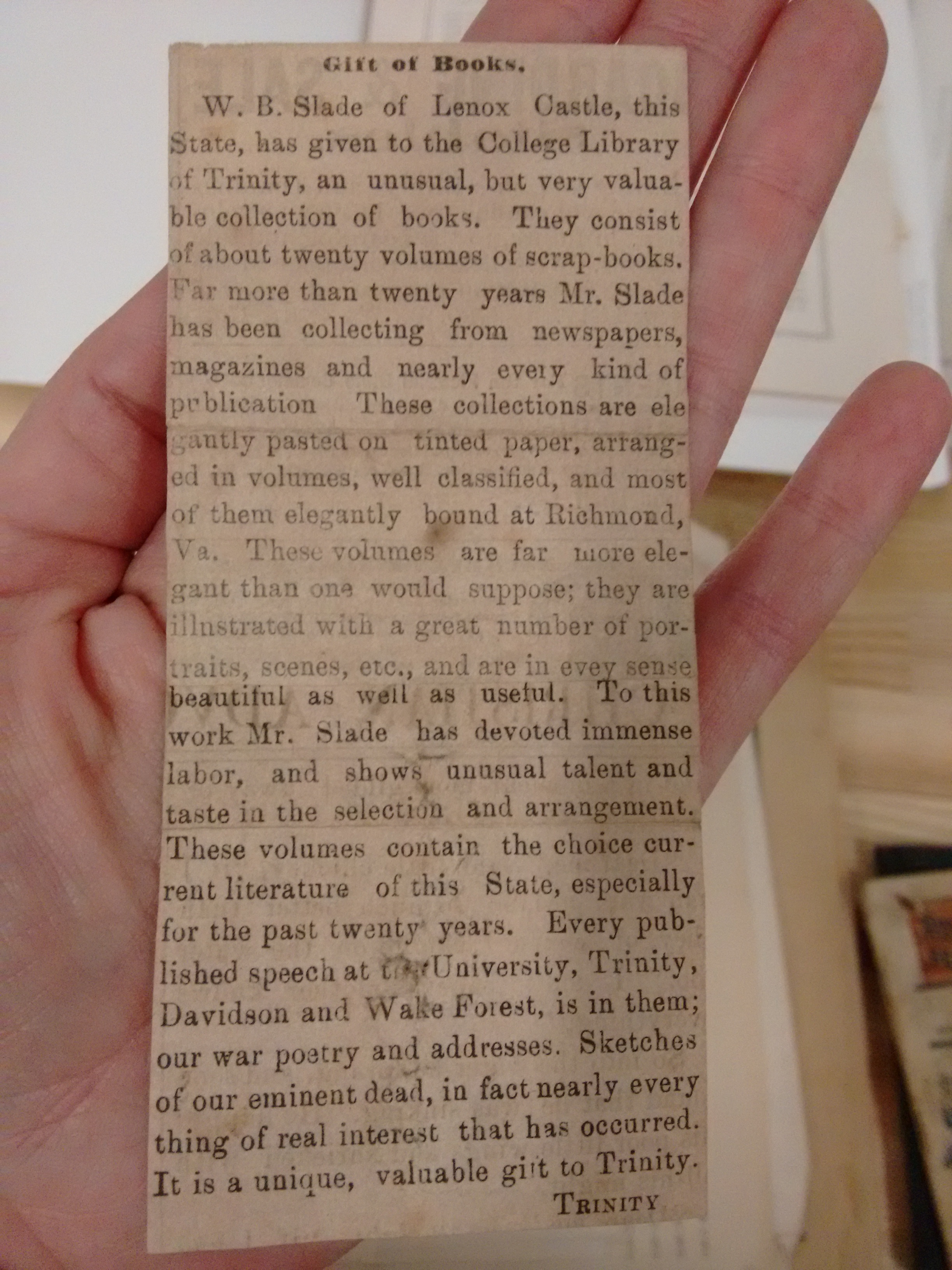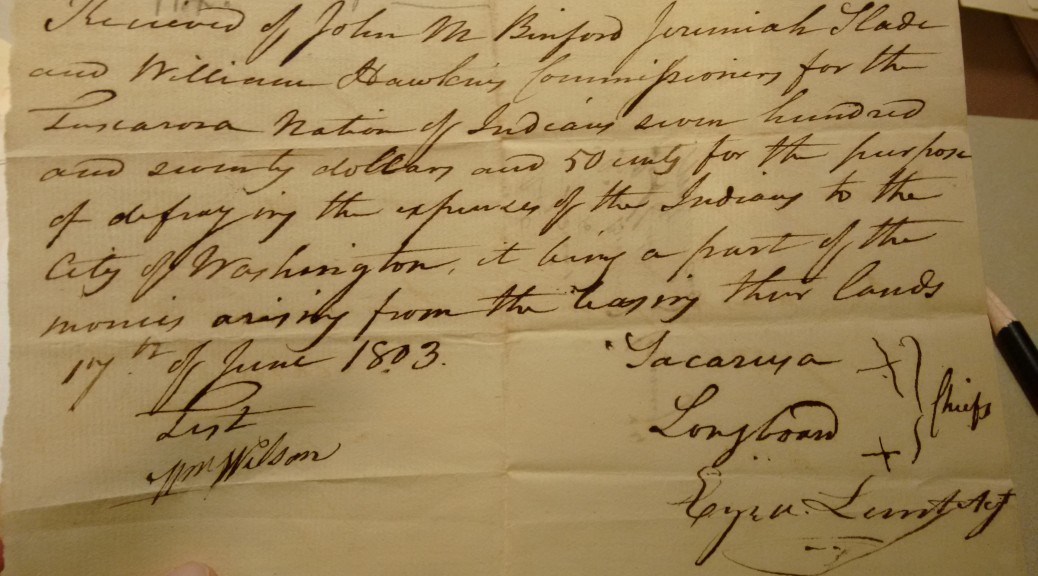This is a story about how our own digital collections program led us to rediscover an amazing manuscript collection that has been at Duke since at least 1896. The Trinity Archive, now published as The Archive, is a Duke University student literary and cultural journal, first published in 1887 while the college was still based in Trinity, N.C. It is one of the oldest continuously-published literary magazines in the United States. Early editions of the Trinity Archive, held in the University Archives, were digitized through Duke’s digital collections program and are now available through the Internet Archive.
It turns out that the Duke University Archivist, Valerie Gillispie, enjoys reading digitized issues of the Trinity Archive. While perusing the December 1896 edition, she found an interesting article: “The Removal of the Tuscarora Indians from North Carolina.” Written by Sanders Dent, then manager of the magazine, the article aims to “arrange some facts found in the old papers of General Jeremiah Slade and, thus, preserve an interesting bit of North Carolina history for her future historian. General Slade was one of the Commissioners appointed by the Legislature in 1802 to settle the affairs of the Tuscarora Indians and from his letters we get most of the material for this sketch.” Dent’s article recounts the history of the Tuscarora in North Carolina in the eighteenth and early nineteenth century. Following the end of the Tuscarora War in 1713, many Tuscarora fled to upstate New York and joined the Iroquois Confederacy as the Sixth Nation. Those that remained in North Carolina were granted land in Bertie County, but by the late eighteenth century they too were being forced to lease their land to the whites and leave the state for New York.
Dent’s article liberally quotes from letters held in the Jeremiah Slade Papers. Between 1803 and 1818, Slade served as an agent for the Tuscarora, managing their land leases in North Carolina and tracking money owed them by their white tenants. The papers include letters, receipts, and legal documents between Slade and the Tuscarora in Niagara, New York, with several documents signed with an X by the chiefs representing their tribe. Dent adds in a footnote that Slade’s “papers are now in the possession of the Trinity College Historical Society.”

Thanks to Dent’s footnote, Val found that the Jeremiah Slade Papers were now held in the Rubenstein Library (but under his son’s name, as the William Slade Papers). It was an exciting connection to our Rubenstein Library ancestors, the Trinity College Historical Society. Founded by Trinity College students and professors in 1892, TCHS sought to “collect, arrange, and preserve a library of books, pamphlets, maps, charts, manuscripts, papers, paintings, statuary, and other materials illustrative of the history of North Carolina and the South.” It was a history club and a museum and a library all-in-one, and many of the library’s oldest Southern collections were acquired by TCHS before being transferred to Duke’s manuscript department in the early twentieth century. (You can read more about the TCHS here and here.)

How and when the Slade Papers first came to the Trinity College Historical Society is still a mystery. The TCHS records, held by the University Archives, are incomplete for that period. A clue lies in the Slade Papers, with an 1884 item from J.D.B. Hooper, a professor at the University of North Carolina. Hooper writes that “I have consented to receive from Mr. William B. Slade, a Box of Scraps, culled by him, from newspapers, magazines, &c. with a request that I will endeavor to have them received into some library, public or private, where they may, at some future time, become useful…” He goes on to write, “I think that they may furnish materials for interesting Scrap books, when they shall fall into the hands of a person of leisure and literary taste.” Um, sure. Thanks Professor Hooper! (His papers are held at UNC.) The only other hint I have found as to the initial transfer of the Slade Papers to Duke lies in this undated clipping from the collection:

But I can find no record of Slade scrapbooks in our accession logs or catalog records from the 1890s. I can only assume that with the scrapbooks came the box of papers that Hooper mentions. It all must have arrived sometime before 1896, when Dent wrote the Trinity Archive piece.
Since this all came to light after Val’s browsing of the Trinity Archive, we decided to revisit the Slade Family Papers, update their housing, and enhance the collection’s description to reflect contemporary descriptive standards and scholarship interests. The original catalog record had no mention of the Tuscarora, and there was no finding aid or other web presence for the collection. It was really fun to re-process such an old collection and see its contents firsthand. The Tuscarora documents, while fascinating, are only a small piece of the Slade story. The majority of the collection documents the nineteenth-century operations of the Slade plantations, farms, and fisheries around Williamston, N.C. Plus, each generation of the Slade family had many children, so there are a lot of letters between all the siblings and cousins discussing their activities, family life, education, politics, and entertainment. There are also extensive legal and financial documents, including receipts, account books, land deeds, court cases, and other items. I was amazed at the amount of documentation discussing slaves; items recording student life at different North Carolina colleges in the early nineteenth century; letters detailing life in the Confederacy during the Civil War; and materials about postwar recovery and politics, including the new business arrangements between the Slades and their former slaves, now freedmen.

It’s always wonderful to see what sort of research can happen as a result of digitization and online access to our collections. But the re-processing and new finding aid for the Slade Family Papers was special. It is one of those rare projects where it all came full circle: because the Trinity Archive was available online, we rediscovered this collection, and along with it, further evidence of the work of the Trinity College Historical Society. The TCHS acquired the Slade Family Papers, among many other things, over 120 years ago for future historians to study and use. We are active participants in that legacy today.


